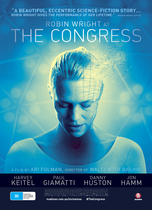 The Futurological Congress (1971) written by Stanislaw Lem forms the basis of Ari Folman’s The Congress (2013). Lem, also known for Solaris (1961), penned the black comedy which explored overpopulation and drug-use to escape reality.
The Futurological Congress (1971) written by Stanislaw Lem forms the basis of Ari Folman’s The Congress (2013). Lem, also known for Solaris (1961), penned the black comedy which explored overpopulation and drug-use to escape reality.
The Congress borrows extensively from the source for the second and third acts, but begins in a world where actor Robin Wright, long lauded for her work in The Princess Bride, has turned her back on Hollywood. She lives on a property adjoining an airfield in nowheresville U.S.A, and is offered a final contract by smarmy executive Jeff Green, played by Danny Huston, who seems to be channeling his role in The Constant Gardener (2005). Robin’s agent Al is played by Harvey Keitel in what seems like a role against type. He has supported her through her anxieties and fears and acts as go-between, pacifying the studio while trying to convince his client of the need to do this final job.
But Robin’s main motivation is to save her son, Aaron (Kodi-Smit McPhee), whose senses are failing him. Doctor Baker, played by an earnest Paul Giamatti, gives her the bad news: without treatment Aaron will soon be deaf and blind.
It was easy to empathise with Robin’s predicament. The deal with Miramount Pictures (with logos that ape Paramount), and Jeff Green are the antithesis of what she believes. She’s the human equivalent of the kite her son flies on their property, floating, moving in the air, subject to the whims of her own nature. And Green wants to own her, wholesale, her heart, her soul, her tears and joy. The job she’s offered is to be turned into a digital Robin Wright so the studio can make movies with her again, partly because it’s easier to direct an automaton, and partly because she’s been such a difficult actor to work with in the past.

In a wonderfully succinct and touching scene, we learn of Robin’s issues with performance and direction; in the scanning chamber she loses her nerve. But she’s saved — if you can call it that — by Al who tells her his story, of his origins, his actions and his love for her. The scan is completed, the job is done. If only the rest of the movie were so well constructed, The Congress would have been a winner.
As it is, the events of the first act disappear in favour of the drug-induced fantasies of The Congress itself in the second and third. In this animated reality, which resembles early Disney and Warner Brothers cartoons, she meets the man who worked on her computer facsimile (Jon Hamm, voiced by Dylan Truliner) but his story is only partially explored. Furthermore, the motivations of Green and Miramar seem unclear. The attack on the hotel is thrown in for no good reason other than it occurred in the original story; similarly, the scene in the sewer beneath the ruined structure appears as well.
As immersive as the animation was, it felt less interesting than the scenes set in the reality where Robin begins her story and finally emerges near the end. Perhaps this in itself was intended, the idea that no matter how far you go into fantasy, reality is always more coherent?
Overall though, it feels like director Ari Folman’s efforts to adapt the original work potentially honoured the source too much. A tighter script may have created a more engaging and focused storyline. As it is, The Congress begins well and loses momentum and clarity the further we progress; intentional or not this leaves the feeling the movie is far less the sum of its parts. Drug fantasies have been explored more coherently in other movies, Altered States (1980) and A Scanner Darkly (2006) to name but two. Here though, the narrative flows from one thing to another without allowing the viewer to get a hold of the ultimate point, which is Robin’s need to be herself and to be there for her son. Her daughter’s disappearance from the story, like that of Al, seems a side-note, and the movie could easily have worked without her inclusion, despite the excellent snarkiness of Sami Gayle as Sarah Wright.
As it is, The Congress is almost a commentary on the cult of celebrity. It’s almost a tale of a parent’s search for their child through the fog of society and growing old. It’s almost a discussion on the temptation to hide from reality in fantasy. And as a result, the movie feels like a missed opportunity.
The Congress is in Australian cinemas from December 4 through Madman Films.






1 Comment